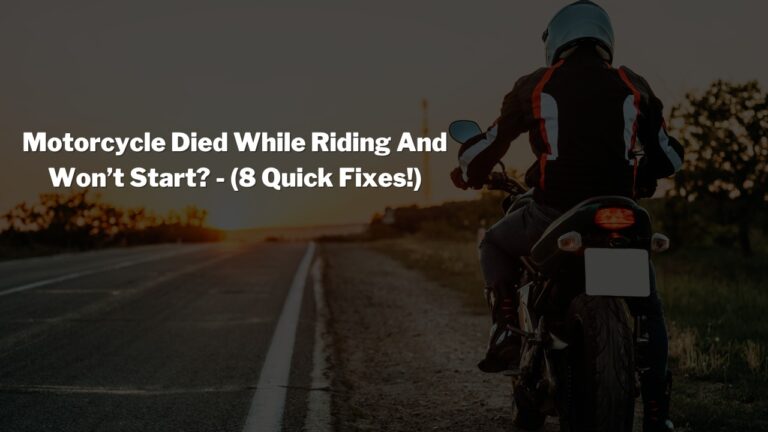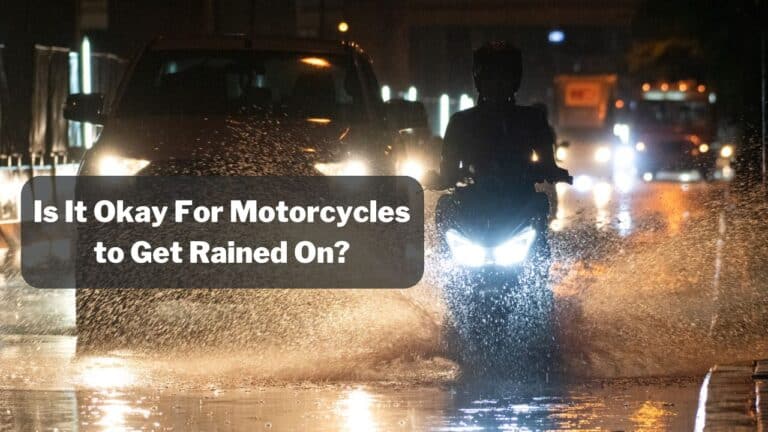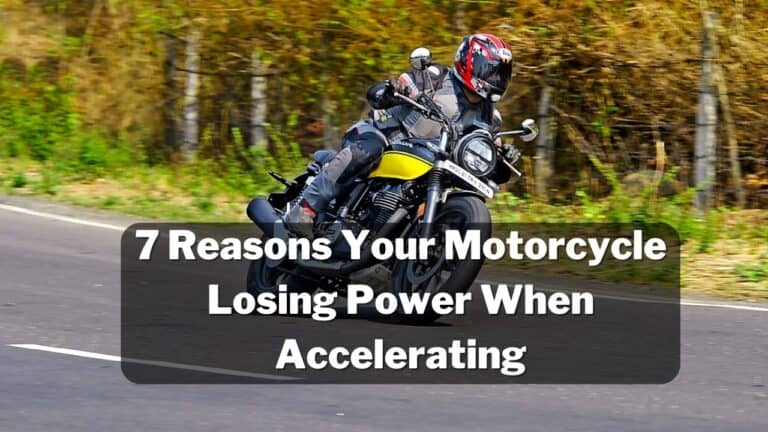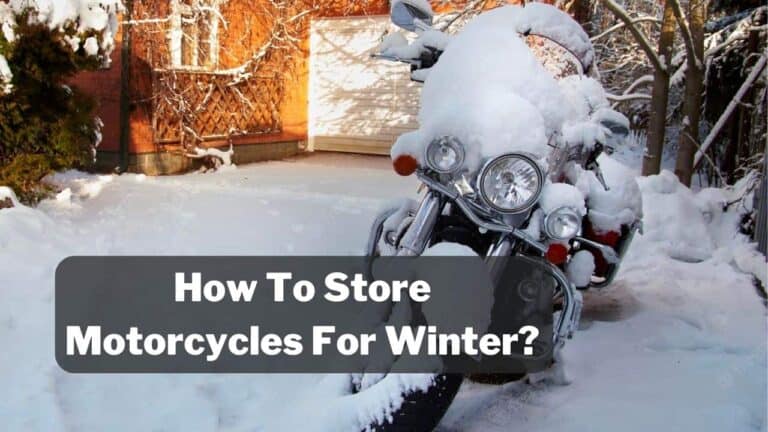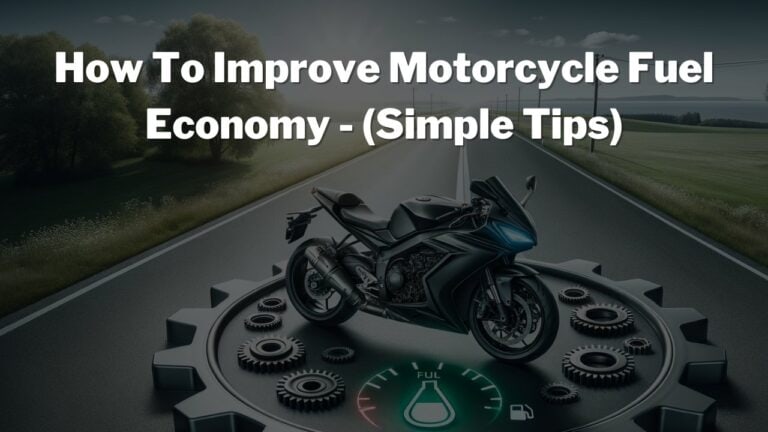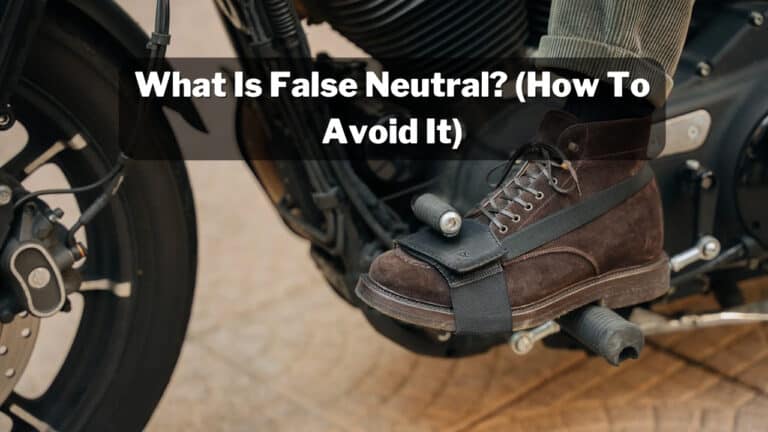What Cause A Motorcycle To Jerk? – (17 Reasons)
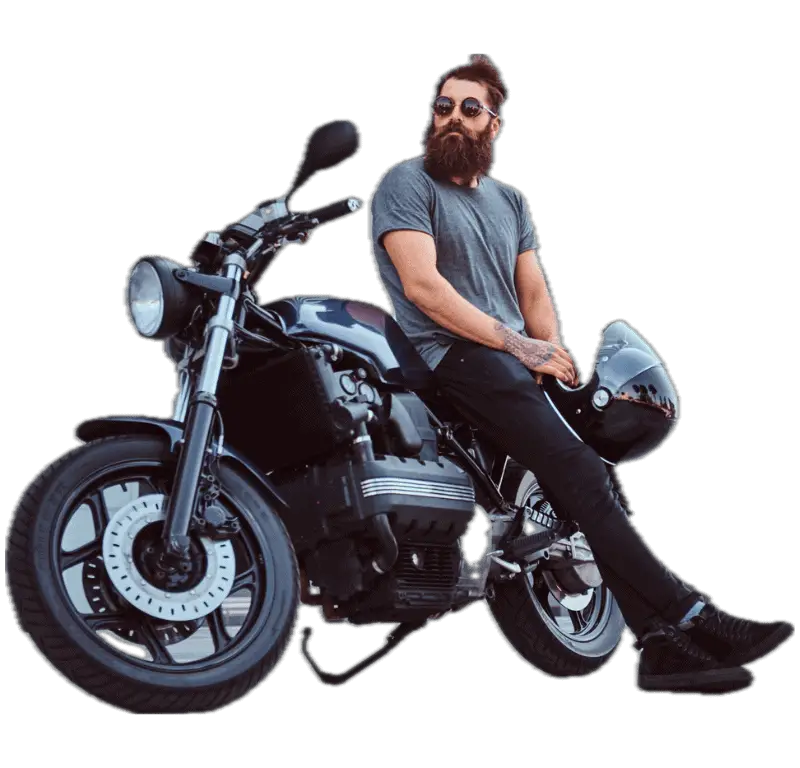
If your motorcycle is jerking and you don’t know how to fix it, this guide is for you. I have faced this problem with my Royal Enfield Classic 350. I did in-depth research about what causes a motorcycle to jerk and found some common reasons.
So, what causes a motorcycle to jerk? The most common reasons for motorcycle jerking are insufficient fuel, a clogged air filter, a dirty throttle body, rusted gas tank passageways, a failing spark plug, poor gasoline quality, incorrect gear-to-speed ratio, too much slack or tension in the chain drive, etc.
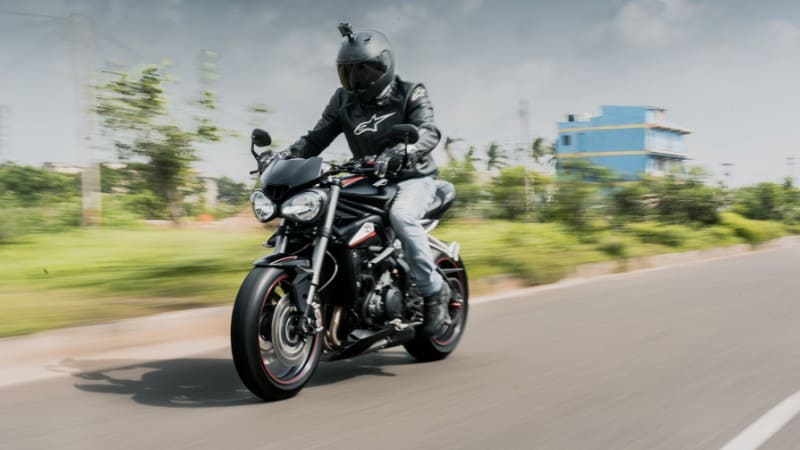
Table of Contents
- 1 What Is Jerking On A Motorcycle?
- 2 What Are The Reasons For Jerking On Motorcycles?
- 2.1 1. Too Much Slack In The Chain
- 2.2 2. Too Much Tension In The Chain
- 2.3 3. Improper Chain Lubrication
- 2.4 4. Defective Chain Links
- 2.5 5. Worn Sproket Teeth
- 2.6 6. Clogged Air Filter
- 2.7 7. Dirty Throttle Body
- 2.8 8. Failing Spark Plug
- 2.9 9. Clogged Fuel Line
- 2.10 10. Vapor Lock
- 2.11 11. Poor Gasoline Quality
- 2.12 12. Bad Engine Oil
- 2.13 13. Faulty Clutch Wire
- 2.14 14. Defective Clutch Plates
- 2.15 15. Drained Battery
- 2.16 16. Faulty Regulator-Rectifier
- 2.17 17. Problems With ECU
- 3 Why Does My Motorcycle Jerk When Accelerating?
- 4 Why Does My Motorcycle Jerk When Putting In The First Gear?
- 5 Why Does My Motorcycle Jerk When Shifting Gears?
- 6 Why Does Motorcycle Jerks At Lower Speed?
- 7 Why Does Motorcycle Jerk When Cruising?
- 8 Conclusion
What Is Jerking On A Motorcycle?
When the rear wheel receives intermittent power due to asynchronous speed between the engine and wheel, it is called the “Jerking” of a motorcycle. This happens due to a failing drivetrain, problems in fuel supply, inaccurate gear-to-speed ratio, defective clutch plates, etc.
In easy language, when you experience intermittent power transfer to the rear wheel instead of smoother due to any reason is known as the jerking of a motorcycle.
What Are The Reasons For Jerking On Motorcycles?
As an automobile engineer, I know the complexity of engine functioning and the smoother power transmission to the rear wheel.
A motorcycle works on a 4-stroke petrol (gasoline) engine that requires a carburetor and spark plug. But, sometimes, the engine doesn’t deliver smooth power to the motorcycle’s rear wheel when any components fail. As a result, your motorcycle jerks.
There are several reasons why a motorcycle jerks, and I have listed them below-
1. Too Much Slack In The Chain
A motorcycle is made to generate constant power and smoothly transfer it to the rear wheel. However, in many cases, the motorcycle produces constant power, but because of too much slack in the chain, it creates problems in power smoother power transfer and motorcycle jerks.
There should be optimum slack in the chain to smoothly rotate between the sprockets. You can find the optimum value of chain slack in the motorcycle user manual (generally 30 to 45 mm) and adjust the chain slack yourself.
I use a chain slack measuring tool that I purchased on Amazon. You can also use a vernier caliper or measuring tape to adjust the chain slack,
2. Too Much Tension In The Chain
Again, too much tension in the chain will create problems in smooth power transmission. There should be sufficient slack so that chainlink rollers rotate between the sprockets. Otherwise, your chain will wear faster, and there should be a high risk of chain breakage.
So, read the motorcycle manual and adjust the chain tension according to your manufacturer. Generally, many motorcycle manufacturers recommend a 30- to 45-mm chain slack for smooth power transmission.
3. Improper Chain Lubrication
In most cases, a motorcycle jerks because of bad power transmission to the rear wheel. A dry chain will wear faster and become noisy. That’s why regular chain maintenance is necessary for smooth riding.
I advise lubricating your motorcycle chain every 300 to 400 miles or every weekend. After riding 500 to 600 miles, clean the chain and apply the chain lube. But, if you ride off-road, you should clean and lubricate your chain every 200 to 300 miles.
You should use a good quality chain lube or gear oil for chain maintenance. Many people make mistakes and use engine oil for chain lubrication, which makes a sticky layer and restricts the roller’s movement. I have already published a detailed guide on this.
4. Defective Chain Links
If your motorcycle jerks when you put in the gear, it means your chain drive is creating problems. Due to improper chain maintenance or the use of incorrect chain lubes, the chain links get damaged.
If any chain links are damaged or stuck, it interrupts the power transmission to the rear wheel, and your motorcycle jerks when you put in the gear. It’s advisable to replace your chain after 2000 to 5000 miles.
5. Worn Sproket Teeth
If you haven’t replaced your motorcycle sprockets for long, there is a high chance that your sprocket teeth will be worn. Worn sprocket teeth are another reason why your motorcycle jerks when you accelerate.
Replacing your motorcycle sprockets after riding every 8000 to 12,000 miles is advisable. However, sprockets should be replaced after 5000 to 7000 miles if you ride your motorcycle fast and in off-road conditions.
6. Clogged Air Filter
Your motorcycle engines need the correct Air-Fuel mixture ratio for consistent power generation. Otherwise, fuel combustion doesn’t happen inside the engine cylinder and fails to deliver power to your crankshaft, and your motorcycle may stall or jerk.
If your motorcycle’s air filter is clogged, the carburetter delivers a rich air-fuel mixture to the engine cylinder. As a result, your engine produces intermittent power and motorcycle jerks.
It’s recommended to clean your air filter after 1000 to 1200 miles and replace it after 4000 to 5000 miles.
7. Dirty Throttle Body
The function of the throttle body is to control the air supply to the engine. Modern vehicles with fuel injector systems have a sensor installed that measures the throttle valve’s position and sends data to the ECU.
The vehicle ECU (electronic control unit) injects the fuel according to the data received from the throttle position sensor. Because of the dirty throttle body, the ECU receives inaccurate data and injects more fuel than required for optimum power generation.
As a result, the engine cylinders receive a rich air-fuel mixture, which causes the motorcycle to jerk. Generally, the mechanic cleans the throttle body when you take your motorcycle for service. But, if your motorcycle’s throttle body is dirty, please clean it with WD-40 and a toothbrush.
Click here to check the price of WD-40 cleaner on Amazon
8. Failing Spark Plug
Your spark plug should quickly ignite the air-fuel mixture in the engine cylinder for proper combustion and power generation. Over time, a layer of carbon forms around the spark plug electrodes.
This carbon fouling creates problems in delivering the spark at the correct timing, resulting in intermittent power generation and your motorcycle jerks. You should replace your spark plug at regular intervals.
The life of copper spark plugs is up to 20,000 miles, platinum spark plugs are up to 60,000 miles, and iridium spark plugs last up to 100,000 miles.
Related Guide: Can You Use Car Spark Plug On A Motorcycle?
9. Clogged Fuel Line
Your motorcycle carburetor or fuel injector should receive consistent fuel from the fuel tank for smooth power generation. If something blocks the fuel passageways, the fuel supply is interrupted and causes intermittent power generation.
If something accidentally clogged the fuel supply line, please get it cleaned by a professional mechanic or replace the fuel supply pipe.
10. Vapor Lock
As I told you earlier, your carburetor or fuel injector should receive consistent fuel from the tank. But, if a vapor lock happens, it creates problems in power generation, which causes a motorcycle to jerk.
Vapor lock is when the liquid fuel changes to a gas while still in the fuel delivery system. Basically, it’s caused by the formation of vapor or bubbles of gas in the fuel-feeding system.
To eliminate the vapor or bubble from the fuel feeding system, cool down the engine, rotate the throttle handlebar to half position, and turn on the ignition key. Do this several times and hold the accelerator bar until the motorcycle runs smoothly, indicating the vapor lock is gone.
11. Poor Gasoline Quality
Poor gasoline quality creates problems in detonation (after compression stroke). If the gasoline burns before the compression stroke, the engine delivers inconsistent power to the wheel and your motorcycle jerks.
Filling your motorcycle with good-quality gasoline is advisable for a smoother driving experience. Ensure you use fresh fuel (not more than 30 days) on your motorcycle.
12. Bad Engine Oil
The purpose of engine oil on a motorcycle is to lubricate the components and keep the piston cylinder and other components cool—every vehicle’s engines use different oil viscosity.
Over time, the viscosity of engine oil drops, and it loses its engine cooling characteristics. That’s why you should regularly replace the engine oil.
If your motorcycle engine oil has gone bad, please change it immediately for proper functioning.
A regular mineral-based motorcycle engine oil should be changed after 2000 to 3000 miles, semi-synthetic oil should be changed after 5000 to 6000 miles, and fully-synthetic engine oil should be changed every 8000 to 10000 miles.
13. Faulty Clutch Wire
A faulty clutch wire will cause a motorcycle to jerk when shifting the gear. So, please replace your clutch wire if it feels too tight or loose when pressing the clutch lever.
14. Defective Clutch Plates
The purpose of clutch plates on a motorcycle is to disengage the drive train (gearbox) from the engine crankshaft. However, due to inappropriate lubrication, the clutch plates burn and stick with the pressure plates, causing your motorcycle to jerk or hard-to-shift gears.
You should replace clutch plates if they are burned due to running without engine oil. It’s better to contact the nearest mechanic garage to replace the clutch plates.
15. Drained Battery
Every motorcycle has a battery that stores the current and delivers it to electrical components like ECU, CDI, and lighting.
If your motorcycle battery completely drains, it will not supply current to the ECU and CDI unit. As a result, your motorcycle will stall or face a jerking issue.
If your motorcycle battery is older than 2 years, please replace it because it has no power-holding capacity.
16. Faulty Regulator-Rectifier
The purpose of a Regulator-Rectifier (RR Unit) is to control the current supply to various electronic components and rectify the voltage received from the stator.
If your motorcycle Regulator-Rectifier has gone bad, it will not charge the battery, and your motorcycle will face starting or jerking problems.
If your motorcycle regulator-rectifier has gone bad, please replace it immediately.
17. Problems With ECU
The modern motorcycle has an ECU that controls the fuel injector, ignition system, and other important components. If your ECU is faulty, it will not operate the fuel injection and ignition system effectively, which results in the jerking of the motorcycle.
You should contact the motorcycle manufacturers to replace the ECU. Otherwise, your motorcycle will not run smoothly.
Why Does My Motorcycle Jerk When Accelerating?
If your motorcycle clutch plates have gone bad, they will slip when you accelerate the motorcycle, which results in jerking. Several other reasons include inappropriate gear-speed ratio, dirty throttle body, and clogged fuel, which also cause a motorcycle to jerk when accelerating.
Why Does My Motorcycle Jerk When Putting In The First Gear?
I recently faced this problem with my Royal Enfiled Classic 350. Whenever I start the motorcycle and put it in first gear, it jerks and tries to move forward without releasing the clutch.
It usually happens due to too much engine oil and inaccurate free play in the clutch lever. A defective clutch plate is another reason your motorcycle jerks when shifting the first gear.
Why Does My Motorcycle Jerk When Shifting Gears?
Extreme tension or too much free play in the clutch lever is the main reason your motorcycle jerks when shifting the gears.
It happens because the clutch plates don’t properly disengage and engage while shifting the gears.
Why Does Motorcycle Jerks At Lower Speed?
Your motorcycle will jerk when you do not shift to a lower gear ratio while lowering the speed. It happens due to an inaccurate gear-to-speed ratio. Every gear is designed for a certain minimum speed.
| Gear | Speed (Miles Per Hour) |
|---|---|
| 1st gear | 0 to 10 MPH |
| 2nd gear | 10 to 20 MPH |
| 3rd gear | 20 to 25 MPH |
| 4th gear | 25 to 35 MPH |
| 5th gear | Above 35 MPH |
Why Does Motorcycle Jerk When Cruising?
One of the most common reasons for jerking while cruising could be a problem with the fuel supply. This could be due to a clogged fuel filter, a faulty fuel pump, or a dirty throttle body that is not delivering an appropriate air-fuel mixture to the engine.
Have you used a primer or paint on your fuel tank? They might be chipping off and blocking the fuel supply. Use compressed air to clean the fuel line and check whether the issue is resolved. If not, please contact the motorcycle service center.
Conclusion
A jerking motorcycle ruins the riding experience, and it is mostly caused by minor problems in the drive train (chain and sprocket) and fuel line. Please follow the above guide to troubleshoot the issue. I hope this guide helped you fix your motorcycle’s jerk problem.
